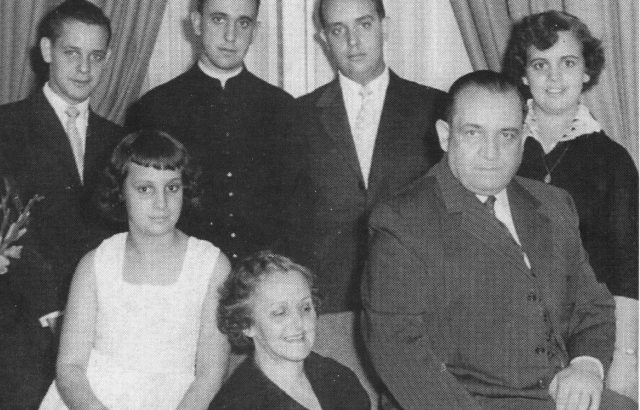With the papal visit imminent we can expect some related documentaries, and on Tuesday of last week RTÉ1 was first in line.
Rebel Pope was a docudrama from National Geographic, and while it was worth watching I wasn’t that impressed. The most interesting aspects dealt with revolutionary times in Argentina when Jorge Bergoglio, later Pope Francis, was Superior of the Jesuits in Argentina. His evolution from ‘authoritarian conservative’ to a more pastoral person was treated rather simplistically and superficially, though the film makers did make some effort to convey his inner struggles after the mistreatment, in Government custody, of his more radical priests.
With so much archive footage and commentators available, the ropey dramatisations felt superfluous and even irritating, with dodgy South American accents in English and rather stilted acting. I did like the emotional scenes with his mother, who didn’t seem too enthusiastic about his vocation, but the torture scenes when the ‘slum priests’ were arrested, were rather graphic.
His election as Pope was dramatised, though very little of the film was about that time, but at the end they used a montage of archive footage of Francis himself – I felt it was only then that the warmth of Pope Francis really came through.
A straightforward documentary would have been much better, especially as they were already quite a bit down that road anyway, with news footage from Argentina, interviews with original witnesses and contributions from biographers like Austen Ivereigh and Paul Vallely.
Gratuitous
Back in the broader culture, political correctness can serve a useful function if it prevents gratuitous offence to vulnerable people, but sometimes it can go too far. It can seem that we’re happier riding the swinging pendulum than practicing a bit of sensible moderation. These thoughts were prompted by an item on Weekend (BBC World Service) last Sunday morning. Protests have halted a popular musical in Montreal – Slav was a performance of slave songs from the African American tradition, but a critic, Marilou Craft, objected to the cultural appropriation, fearing it would only be white people performing the songs.
The performer, Betty Bonifassi, was trying to show the universality of the experience of slavery across several ethnicities, but this wasn’t enough to save the show. Craft was adept in not answering questions, e.g. asked if whites should ever be allowed sing such slave songs, she answered that she had no problem with whites ‘talking’ about them. I can understand programmes like The Black and White Minstrel Show going out of fashion as culture matures and develops, but this latest example goes over the top.
Later that morning I heard on RTÉ Radio 1’s News about Minister Regina Doherty progressing a bill to allow children change gender more easily.
More strange priorities I thought in the light of crises in health and housing, not to mention the recent referendum – abandoning the right to life of some children but giving others a right to pick and choose their gender!
A related discussion on Sunday Morning Live (BBC 1) last weekend wondered ‘Should children be raised gender neutral?’ but the discussion focused too narrowly on skirts v trousers for girls. At least we got a variety of perspectives on the matter. Julie Lynn of Conservative Woman identified a ‘creeping ideology’ – she thought children shouldn’t be forced to present as gender neutral and favoured choice – girls should be able to wear skirts in school if they wanted to.
Transgender actor Rebecca Root disagreed and wanted trousers to be obligatory for school uniforms. Pastor Clement Okusi was not happy with schools pushing the idea to kids that you can change gender – he thought it no more possible than him changing the colour of his skin.
It often puzzles me how people who identify as the opposite sex get adulation, while those who identify as a different colour (e.g. trans black) get lambasted for cultural appropriation.
Over emphasising sexual identity can be a trap, especially for the young, according to Daniel Mattson, who was interviewed on Life on the Rock (EWTN) last Saturday. Formerly in a gay relationship he now identifies as a loved child of God and lives in harmony with Church teaching, helped by the Courage Ministry.
Without being in any way homophobic or insensitive he had lots of sensible and empathic advice, including for parents whose children show same-sex attraction, as outlined in his book Why I Don’t Call Myself Gay.
Pick of the week
Murach gur Tharla
TG4, Saturday, July 14, 11 am
Historians discuss Catholic Emancipation and what might Ireland be like today if it hadn’t happened.
Mass
RTÉ, Sunday, July 15, 11 am
Mass of the Family from Co. Laois, specially composed by Tom Conroy. Celebrated by Bishop Denis Nulty with soloist Orla Fallon.
Father Brown
RTÉ1, Tuesday, July 17, 3,30 pm
Unseasonal Christmas episode kicks off season 5 featuring Chesterton’s priest-sleuth.


 Brendan O’Regan
Brendan O’Regan Jorge Mario Bergoglio, a young Pope Francis, pictured with his family – his papal approach was the subject of Rebel Pope broadcast on RTÉ1.
Jorge Mario Bergoglio, a young Pope Francis, pictured with his family – his papal approach was the subject of Rebel Pope broadcast on RTÉ1.